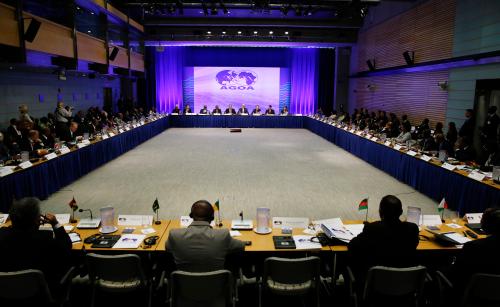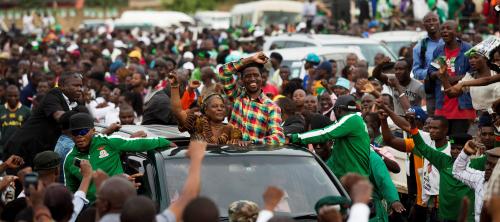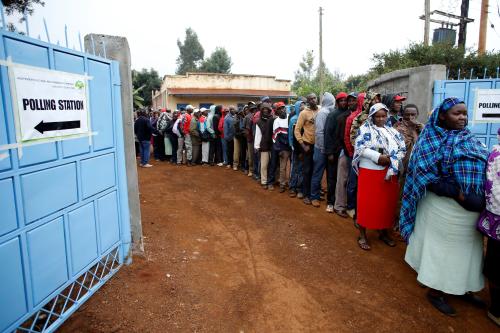The US suspends Rwanda’s AGOA eligibility on apparel over secondhand clothing row
Late last week, the United States announced a 60-day suspension of Rwanda’s African Growth and Opportunity Act (AGOA) duty-free privileges on clothing in response to the East African country’s increase in tariffs on U.S. clothing imports and a ban on used clothing imports. Already in 2016, Rwanda, in an attempt to phase out imports on used clothing, raised tariffs from $0.20 to $2.50 per kilogram.
Though other East African countries had announced similar restrictions—including an agreement to phase out used clothing by 2019, Kenya’s policy reversal and Tanzania and Uganda’s recent “steps toward eliminating prohibitive tariff rates on imports of used clothing and footwear and commit[ment] not to phase in a ban of these products” have meant that their duty-free privileges remain intact.
The dispute began in March 2017, when the Secondary Materials and Recycled Textiles Association (SMART) petitioned the U.S. government for action against East African countries implementing a ban on secondhand clothing and footwear. According to the trade group, the tariffs and ban “imposed significant hardship” on the U.S. industry, costing it 24,000 jobs and potentially $124 million.
Rwanda seems unlikely to scrap the tariffs or ban: President Paul Kagame has stated that he is willing to sacrifice access to AGOA in order to grow Rwanda’s domestic textile industry, saying, “Rwanda and other countries in the region that are part of AGOA, have to do other things, we have to grow and establish our industries.” In addition, according to Quartz, in 2017, Rwanda exported $43.7 million in goods under AGOA, compared to Kenya’s $600 million.
For analysis on the effects of the secondhand clothing ban in East Africa, see “Trump’s ‘trade war’ includes punishing Africans for refusing second-hand American clothes,” in Quartz Africa.
Botswana’s and Sierra Leone’s new presidents are inaugurated
President Ian Khama of Botswana resigned from office on Saturday—the exact day he reached his 10-year term limit. In a planned and seamless transfer of power, Mokgweetsi Masisi, vice president of Botswana, was inaugurated as the country’s fifth president on Sunday. His inaugural address focused on plans to tackle the country’s “myriad of challenges,” with the top priority being “the problem of unemployment, especially among the young people who constitute the majority of our population.”
Masisi will lead the nation until national elections are held in October 2019. At that time, Botswana will choose its members of parliament, and then the party with the majority of votes will elect the president. It is expected that the ruling Botswana Democratic Party (BDP) will name Masisi its presidential candidate as he will have had 18 months to assert himself within the party. Masisi’s transition to the presidency mirrors that of Ian Khama, who also came to power following the resignation of his predecessor in 2008, a year before the 2009 national election. According to Quartz Africa, the BDP uses this system of succession to groom new leaders prior to the elections.
Meanwhile, in Sierra Leone, the results of Saturday’s runoff election emerged on Wednesday. According to the electoral commission, Julius Maada Bio—the leader of the opposition Sierra Leone People’s Party, as well as a former military commander and coup leader—won with 51.8 percent of the vote. He defeated Foreign Minister Samura Kamara of the ruling All People’s Congress, who garnered just 48.2 percent of the vote. Bio was sworn in immediately after the election results were announced, thus concluding the country’s tense election season, which was largely peaceful, but still marred by some irregularities and violence.
President Mnangagwa visits China with hopes of attracting investment
This week, April 2-6, President Emerson Mnangagwa of Zimbabwe is on a state visit to China, his first state visit outside Africa since he became president early this year. During his meeting with Chinese President Xi Jinping, the leaders discussed “writing a ‘new chapter’ in ties.” Addressing reporters on his goals for the trip, Mnangagwa focused on the need to attract more investment to Zimbabwe, saying, “The issue is not only about attracting capital into Zimbabwe. It’s an issue of leapfrogging after 18 years of isolation so that we catch up with the rest of the developing countries.”
During the trip, the government and Zimbabwean businesses signed several deals including for the refurbishment of the Hwange power station’s unit 7 and 8, which will increase power generation by 600 megawatts. China Communication Construction Company and Zimbabwe signed a memorandum of understanding for the former to open a local office and invest in road, rail, air, and dam construction projects in the country. Beyond these major deals, several other memorandum’s were signed in the education, agriculture, and skills development sector as well.
On Thursday, April 5, Zimbabwe also introduced a new bill in parliament that will require mining firms to list on local stock exchanges in an effort to boost local ownership of mineral resources. The text of the bill says, “No mining right or title shall be granted or issued to a public company unless the majority of its shares are listed on a securities exchange in Zimbabwe.” Currently, companies engaged in platinum or diamond extraction are already required to have 51 percent local ownership. According to Reuters, companies listed elsewhere would have to reinvest funds from public offerings to develop Zimbabwean mines.
Anti-apartheid activist Winnie Madikizela-Mandela dies at 81
South African activist Winnie Madikizela-Mandela passed away on Monday, April 2, in Johannesburg. In 1976, according to the BBC, her anti-apartheid resistance, her fight for social justice, and her hardships—including imprisonment and banishment—earned her the name “Mother of the Nation.” In the 1980s, she established a name for herself as a radical activist based in Soweto, becoming a leader known for her harsh tactics in the struggle against apartheid.
Despite her popularity, her activism was plagued by controversy, as she was implicated in (and convicted of) kidnapping, violence, and supporting “gross violations of human rights.” After the end of apartheid, she became a popular politician, but again found herself in trouble with the law, being found guilty of fraud in 2003.
Despite these controversies, Madikizela-Mandela remains an important figure in the struggle against apartheid and in the history of South Africa, receiving the Order of Luthuli, one of the country’s highest honors, in 2016. She will receive a special high-level, official funeral, set for April 14 in Soweto, according to Minister in the Presidency Nkosazana Dlamini-Zuma.






Commentary
Africa in the news: Rwanda’s AGOA suspension, leadership transitions, and Mnangagwa’s China trip
April 6, 2018